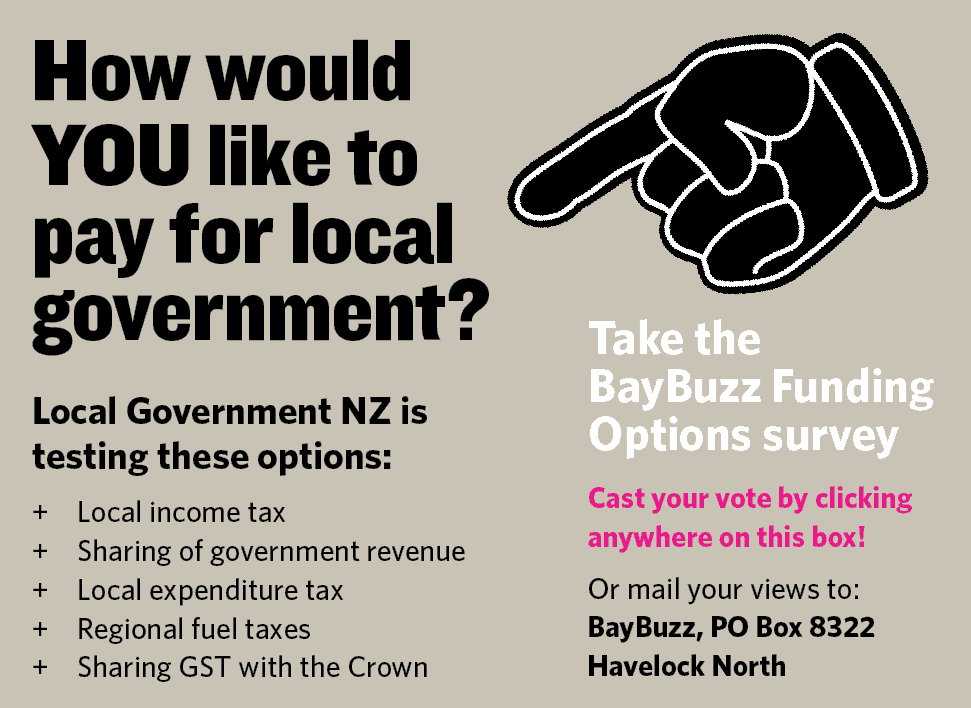Nobody likes paying rates, but without them modern infrastructure and the services people seem to expect from local government would not exist.
With an average daily cost of $5 per household, what you pay your council is now usually less than your electricity bill and for many families less than your daily caffeine fix. Equally many households now spend more on telecommunications and data access than they pay to their city or district.
For some, such a choice may appear better value for money or a higher priority, but they are wrong. Council expenditure generally provides extremely good value for money and collectively we can do things far more efficiently than individually.
Discussing future funding arrangements for local government is never going to be an easy conversation. The recently released Local Government New Zealand Funding Options Report generated significant media attention. The report is a culmination of work by a dedicated group of political, economic, banking and private sector experts. Interestingly, following its public release commentators were evenly split on the merits of a different approach to funding what your council does.
The board of LGNZ (which I chair) were unanimous in their view that future funding arrangements had to be reviewed. Not because current systems are failing, but rather the future poses very different challenges than are present today. Most of the challenges are around changes in population, where people live and how ageing infrastructure was originally funded.
The salient issues are these:
- In the next two decades 32 out of the 68 councils in New Zealand will experience population decline.
- For most areas in New Zealand the percentage of the population over 65 will increase from 10-20% to 20-30%. A significant aging of the population and many more people on fixed incomes.
- Much of the infrastructure for water, wastewater and storm water was built in the 50s and 60s, and in many cases this was funded almost entirely by the Crown. Much of this infrastructure is coming to the end of its useful life.
- The majority of the roading network was built with the government funding 90% of the cost. Today the government only funds around 50% of these costs.
- New issues relating to natural hazards, earthquake strengthening and climate change have begun to generate massive costs, which have not been properly considered in current funding models.
- A large chunk of Crown-owned land pay no rates because of a government imposed exemption law.
In law, rates are a tax on property and unlike central government taxation they are unconnected to the income earning ability of an individual ratepayer. Simple in concept, they use relative wealth as determined by property value to calculate your share of council expenditure. Equally, the collection of these rates is done completely independently from the central taxation system. A property-based system of collection is regressive on fixed income people even if they are asset rich.
I often hear commentary that many councils are indebted and that somehow this debt is out of control. In fact, the situation is quite the contrary, with total local government assets valued at $117 billion and total debt at just $10 billion. This very conservative ratio is often forgotten because people find the numbers so large.
Against this background ratepayers across the country need to realise that the world is changing. No longer will previous funding arrangements reliant on property value be fair. And in many they will become far less affordable for our aging population. Importantly, we need to understand there is an ever increasing demand for better services, often with people not wanting to pay for them.
The discussion paper released by LGNZ includes these options: local income tax, sharing of government revenue, local expenditure tax, regional fuel taxes, and sharing GST with the Crown. Additionally there is discussion about further enhanced efficiencies in the delivery of services and a serious conversation about reducing the level of services offered in order to reduce budget pressure.
I have not personally ruled any of these concepts out, apart from a poll tax. This form of tax may appear the fairest form of revenue collection, but as Margaret Thatcher found, it is very unpopular.
Importantly, LGNZ is not advocating that more money needs to be introduced into the system. It is suggesting that a property-based rating system alone will not fairly fund the changing makeup of New Zealand.
To convince any government that council should take some of their resources will be no easy task. The first hurdle will be to convince taxpayers and ratepayers alike that there is a problem, and then secondly show that councils are operating as efficiently as they can with the current resources available.
In Hawke’s Bay we are not immune from these issues. Wairoa and Central Hawke’s Bay have declining populations. Even in Napier and Hastings where the population is growing, people are getting relatively older.
Unless we can find a more balanced system of funding council costs, the older generation particularly are going to be further reliant on government handouts or the very unpopular reverse mortgages. I sense that many people would prefer something different.
It is instructive that how things are done in NZ is not mirrored everywhere across the globe. In many countries, including Europe, taxpayers make a direct contribution towards local services. By international comparison, NZ has one of the higher levels of local funding for council services.
Leading an organisation that is challenging the status does mean speaking out and raising difficult issues with citizens. Such an approach may not be popular, but I would rather test new options than walk through the next two decades knowing that what we are doing today will ultimately fail.
I accept the government will not want to give away GST revenue or set up locally-based taxation. But faced with the challenges outlined they may be left with no choice. Achieving greater efficiencies can take us only so far. If people continue to insist on increased levels of service, value the communities they live in, and yet face a fixed income, they will demand a different approach.




I agree with Lawrence and support the need for a major rethink on how local infrastructure and services could be funded.
Care needs to be taken as anything that adds a few dollars more to what we are already paying for will be met with criticism. For example you will always get people complaining why they are having to contribute to something they don’t use.
Perhaps the answer is to have a standard base fee that is topped up via a ‘user pays’ system.
Whatever the answer is, we will need to be thinking outside the square on how a replacement for the current rates system can be achieved.
Personally I think this should be one issue that is high on the agenda of an amalgamated Council – which bye the way I believe will make it much easier to bring multi million or billion dollar investors establishing new industries (perhaps an O&G industry) into HB. Royalties payable to the Council would also assist in covering infrastructure and services costs.
The rates we pay on our small property in Mangawhai would enable me to end my life with caffeine poisoning if I spent that much on coffee. If councils used the money they collect to actually pay for the services supplied, and nothing else, rates could be reduced to a small fraction of their current levels. But where I live, and I have no doubt elsewhere, 80% of what is collected now goes to banks to keep the whole sorry gruesome disaster from sinking. Thousands of us out here worked our butts off all our lives so we could go into retirement debt free, and irresponsible oafs like Lawrence Yule are re-mortgaging us to finance monuments to their own inanity.
Rates are paid on land value. Since the banks own most of the New Zealand land value in Mortgages, why are they not paying the rates in proportion the their real ownership of the land asset.
Currently the Banks are getting a free ride here in NZ and nobody wants to do anything about it since NZ politicians are insider trading with present or past interest in the banking system.
How can we make change when the poacher is also the gamekeeper?